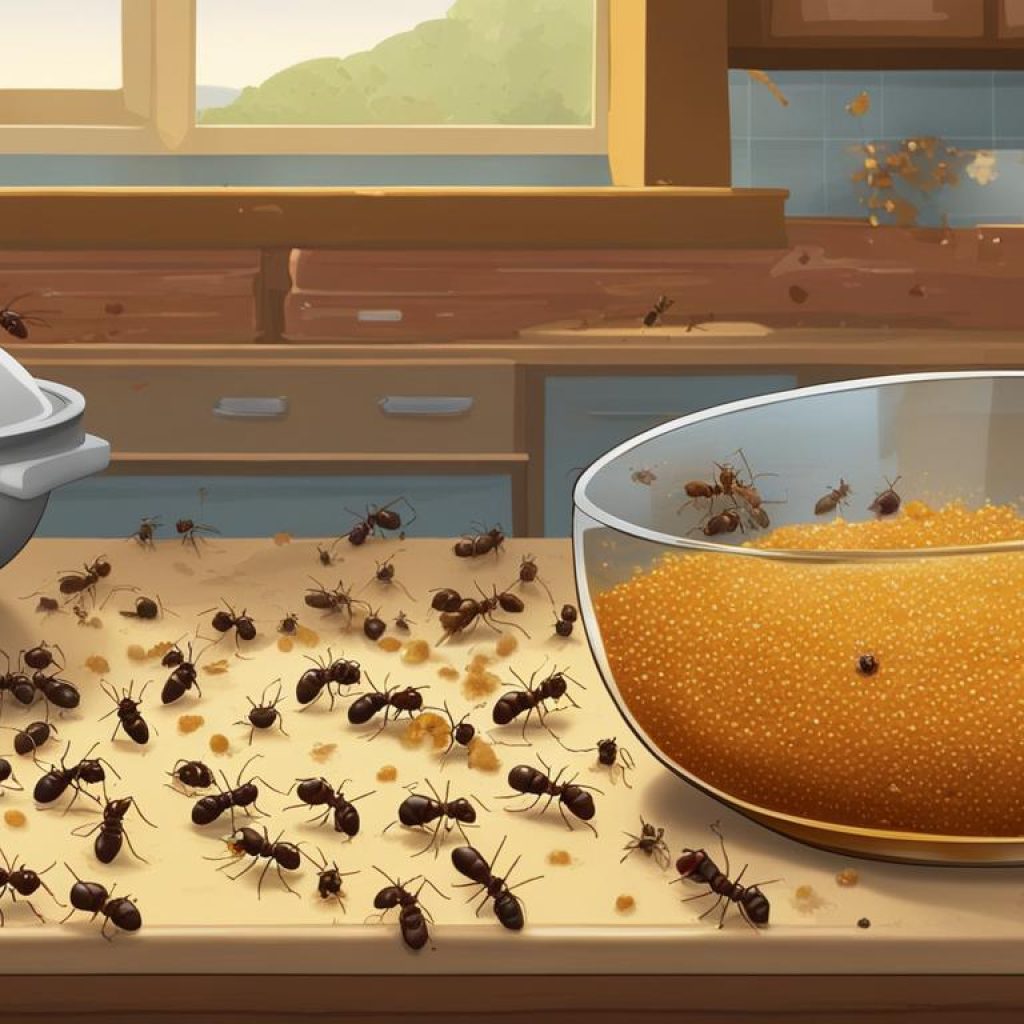Are ants taking over your kitchen? Dealing with ant infestations can be a frustrating and persistent problem. But fear not, because we have the solutions you need to get rid of them for good. In this article, we will discuss effective methods to eradicate ant infestations in your kitchen, ensuring a pest-free environment for you and your family.
Key Takeaways:
- Identify the entry points and locate the ant nest for effective eradication.
- Preventative measures like sealing entry points and storing food in sealed containers can help keep ants out of the kitchen.
- Ants are attracted to sweet foods and water, so it’s important to eliminate these sources.
- Homemade methods using cayenne pepper, vinegar, and diatomaceous earth can be effective in repelling and killing ants.
- If DIY methods fail, consider professional pest control services to address the infestation.
Reasons for Ants Appearing in the Kitchen
Ants suddenly appearing in the kitchen can be a frustrating experience. Understanding the reasons behind these unwelcome visitors can help you prevent and address ant infestations effectively.
Sweet foods like honey, sugar, fruit juice, and syrup are particularly attractive to ants. If you leave these items exposed or fail to clean up spills and crumbs, you may unwittingly invite ants into your kitchen. They are also drawn to water, which can be found in moist and humid areas of the kitchen, such as near sinks or leaky pipes.
Ant infestations may be more common during warmer seasons, as ants become more active and seek favorable conditions. Heavy rains can also drive ants indoors if their nests are flooded. By understanding these reasons, you can take proactive measures to prevent ants from taking over your kitchen.

DIY Methods to Get Rid of Ants in the Kitchen
If you’re struggling with a persistent ant problem in your kitchen, there are several effective homemade methods you can try. These natural ant repellents can help eliminate the infestation and deter ants from returning. Let’s explore some of these homemade methods:
1. Cayenne Pepper or Black Pepper
Both cayenne pepper and black pepper can be powerful ant deterrents. Sprinkling these spices around the areas where ants congregate can disrupt their scent trails, making them less likely to return. Remember to reapply the pepper if it gets wet or loses its potency over time.
2. Vinegar
Vinegar is known for its strong smell, which ants dislike. Mix equal parts of vinegar and water in a spray bottle and spritz it along ant trails, entry points, and other infested areas. The smell will disrupt their communication and discourage them from entering your kitchen.
3. Food-Grade Diatomaceous Earth
Food-grade diatomaceous earth is a natural and safe alternative that can kill ants without harmful chemicals. This powder is made from fossilized remains and contains microscopic sharp edges that cut into the ants’ exoskeleton, leading to their dehydration and eventual demise. Apply diatomaceous earth along baseboards, countertops, and other areas where ants are active.
4. Boric Acid Powder
Boric acid powder is another effective ant killer that can be used to eliminate ants inside their nest structures. It acts as a stomach poison when ingested and can be carried back to the colony, killing off the entire ant population. However, exercise caution when using boric acid powder, especially if you have pets or small children, as it can be harmful if ingested in large quantities.
5. Commercial Traps or Homemade Ant Killers
If you prefer a ready-to-use solution, consider using commercial ant traps or homemade ant killers. One common homemade ant killer is a mixture of borax and sugar. Simply combine equal parts of borax and sugar, and place small amounts of the mixture near ant trails or entry points. The sweet scent of the sugar will attract ants, while the borax acts as a poison, effectively killing them and the entire colony over time.
It’s worth noting that while these homemade methods can be effective, they may not completely eradicate a large ant infestation. For severe or recurring problems, it’s advisable to seek professional pest control services for more targeted and long-term solutions.
Remember that prevention is key in keeping ants out of your kitchen. Regularly clean up spills, crumbs, and other food debris, and store food in sealed containers. Additionally, seal any cracks or gaps in windows, doorways, and floors to prevent ants from entering your home.
| DIY Ant Repellents | Key Ingredients | Effectiveness |
|---|---|---|
| Cayenne Pepper or Black Pepper | Pepper | Moderate |
| Vinegar Solution | Vinegar and water | Moderate |
| Food-Grade Diatomaceous Earth | Diatomaceous earth | High |
| Boric Acid Powder | Boric acid | High |
| Commercial Traps or Homemade Ant Killers | Borax and sugar | High |
Conclusion
In conclusion, getting rid of ant infestations in the kitchen requires a systematic approach. Identifying the entry points and locating the nest are crucial steps in effectively eliminating ants. Various homemade and natural methods, such as using spices like cayenne pepper or applying vinegar, can be used as ant deterrents. Additionally, food-grade diatomaceous earth and boric acid powder offer effective solutions for killing ants and targeting their nests.
If DIY methods do not yield the desired results, it is advisable to seek professional pest control services. These experts have the knowledge and experience to handle severe infestations and use specialized treatments to eliminate ants effectively.
Prevention is key to avoiding future ant infestations. Sealing entry points, practicing proper sanitation, and storing food in sealed containers are crucial preventive measures. By following these expert tips, you can ensure a clean and ant-free kitchen, giving you peace of mind and protection against these pesky invaders.
FAQ
How do I know if I have an ant infestation in my kitchen?
Signs of an ant infestation in the kitchen include seeing trails of ants, finding ants in and around food sources, or discovering ant nests in cabinets or other areas. If you’re unsure, it’s best to consult with a pest control professional for an accurate assessment.
What should I do if I find ants in my kitchen?
If you encounter ants in your kitchen, it’s important to address the issue promptly. Start by identifying and sealing any points of entry, clean up food spills and crumbs, and store food in sealed containers. Additionally, use homemade repellents or commercial ant traps to eliminate the current infestation.
Can I get rid of ants in my kitchen myself, or should I call a professional?
DIY methods can be effective for small ant infestations. However, if the infestation persists or if you’re dealing with multiple colonies, it may be best to seek professional help. Pest control experts have the knowledge and tools to effectively eliminate ant infestations and provide long-term prevention strategies.
How can I prevent ants from entering my kitchen?
To prevent ants from entering your kitchen, keep it clean and free of food debris, seal cracks and crevices, and eliminate any standing water sources. Store food in airtight containers and regularly empty trash cans. Adding natural deterrents like cayenne pepper or vinegar can also help keep ants at bay.
What are some effective homemade methods to get rid of ants in the kitchen?
There are several homemade methods you can try to eliminate ants in the kitchen. Sprinkling cayenne pepper or black pepper near their entry points can deter them. Vinegar can also be sprayed on surfaces where ants are present, as they dislike its strong smell. Food-grade diatomaceous earth and boric acid powder can be used to kill ants and destroy their nests.
Are commercial ant traps or baits effective in getting rid of ants in the kitchen?
Yes, commercial ant traps and baits can be effective in eliminating ants in the kitchen. They contain a sweet substance mixed with insecticide, which attracts the ants. The ants then carry the bait back to their colony, effectively eliminating the entire nest. Be sure to follow the manufacturer’s instructions when using these products.


